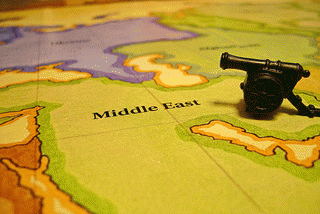In March, the U.S. expressed confidence that Bashar al-Assad's regime had secured its chemical weapons stockpiles and they would not be used in Syria's civil war. Assad's elite special forces had been deployed to chemical weapons sites with the sole mission of preventing the weapons from falling into terrorist hands. Nine months later, with an estimated 40,000 Syrians killed, world leaders now express concern that Assad's regime is preparing to use the chemical weapons as a desperate last move in the civil war.
Syria's chemical weapons stockpiles, the largest in the Middle East, have added a terrifying dimension to the bloody conflict. Rebel forces scramble to locate and secure chemical weapons sites to prevent their use by the regime. Independent reports of the use of chemical weapons have already surfaced from Syria with videos of forces loyal to Assad launching white phosphorous canisters at rebel troops. Assad's regime has made public statements accusing the rebel troops of acquiring chemical weapons and planning to use them with the intention of blaming the regime.
Syria's chemical weapons have become a liability for the Middle East and neither Assad's regime nor rebel forces have fostered confidence that they are in safe hands. Israel has remained largely silent about the battles that are raging kilometers away from its borders. In July, Prime Minister Benjamin Netanyahu stated that his main concern was who would acquire Syria's chemical weapons in the chaos of the civil war. "Can you imagine Hezbollah-the people who are conducting, with Iran, all these terrorist attacks around the world-if they had chemical weapons?" Netanyahu stated in an interview with Fox News. (Syrian Civil War Boosts US-Israeli Defense Ties, Jerusalem Post, 7/23/2012)
According to a Thursday report from the New York Times, Hezbollah's close ties and support to Assad's regime have placed them in a special position to acquire Syria's chemical weapons. After the outbreak of violence in 2011, Hezbollah, the Shiite military and political organization based in Lebanon, was rumored to have deployed thousands of fighters to support the Shiite Alawite government of Bashar al-Assad. While Hezbollah has publicly denied supplying foreign fighters to augment security forces loyal to Assad, a senior Hezbollah official did state to the New York Times that Hezbollah was involved in certain operations on a, "logistics level." (Lebanon's Shiites and Sunnis Battle in Syria, New York Times, 12/19/12)
Hezbollah's involvement in Syria's conflict has become apparent in media reports and martyr posters of young Shiite fighters killed in battle. Hezbollah's role as trainer and adviser to the Syrian Army has reportedly given it special access inside Syria with vehicles that are not subject to checkpoints. The alliance between Hezbollah, arguably the most professional and well-trained militant group in the region, and Bashar al-Assad's regime has transformed Netanyahu's imaginary circumstance into a very real possibility.
The Sunni militant groups that have joined together under the Free Syria Army to depose Bashar al-Assad have rekindled fear about Syria's chemical weapons stockpiles falling into the wrong hands in the advent of regime change. The Obama administration has named the affiliation of a select group of militant organizations with Sunni terrorists, such as al-Qaeda, as the source of their hesitation over supplying the rebel forces. On Tuesday December 11, the US officially recognized the Syrian Opposition Coalition as the legitimate representatives of the Syrian people. Almost simultaneously, the State Department listed Jabhat al-Nusra, the militant group involved in the fight against Assad, as a terrorist organization due to its alleged link to al-Qaeda.
There do not seem to be any scenarios in Syria where the chemical weapons stockpiles are safe from use. Even if Syria's opposition forces transform into the moderate political establishment the US hopes for, rebel forces have stated that they do not have the capabilities to secure Syria's chemical weapons; the possibility that they could fall into terrorist hands is high. Many fear that Bashar al-Assad will turn his chemical weapons arsenal against his citizens, unleashing chemical weapons on the world for the first time in three decades. Hezbollah's close relationship with the regime has placed it in a prime position to inherit Syria's stockpiles.
The Chief of Israel's Air Force, Amir Eschel, has stated that they are preparing for every scenario involving Syria's chemical weapons. In mid-December, Israel began to distribute nerve gas antidotes to its combat troop medics. The London Sunday Times reported that Israeli Special Forces were operating inside Syria to locate and destroy the chemical weapons stockpiles. According to an unnamed source, the covert operation was ordered after an aerial strike was deemed to risky. Israel has warned that if Hezbollah acquires chemical weapons, Syria's civil war will erupt into a much larger and deadlier conflict.





